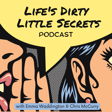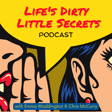
Secret #43: Who Am I? Navigating Identity in Young Men with Nike Oruh
In this episode of Life's Dirty Little Secrets, hosts Emma Waddington and Chris McCurry are joined by Nike Oruh, a therapeutic specialist and clinical lead counselor at Edinburgh Napier University.
The discussion delves into the struggles young men face today, focusing on their search for purpose, the influence of social media, gender role shifts, and the need for safe spaces to express emotions.
The conversation emphasizes the importance of emotional vocabulary, positive role models, and community support systems to help young men navigate the complexities of modern masculinity and emotional well-being.
Highlights:
- Understanding Young Men's Behavior
- Anger and Emotion
- Addressing Societal Issues
- Intersectionality and Resilience
- Emotional Support Framework
- Safe Spaces for Expressions
- Role Models and Empowerment
- Managing Struggles and Empowerment
Resources Mentioned in this Episode:
- Jackson Katz: https://search.app/EfiaBa6UdeuMJhKw9
About Nike Oruh:
Subscribe to Nike’s Substack - VII Breaths Substack: VII Breaths Journal
Nike is an experienced therapeutic specialist with a demonstrated history of working in the Health & Wellbeing industry. He has spent the past two decades involved in emotional and sexual health, which began with a non-profit organisation whose main aim was to help young people make informed choices. Nike has developed his communication skills, training and experience as a therapist across various settings and environments. Which led to his contribution to the seminal counselling book First Steps in Counselling (5th Edition) (PCCS Books).
His expertise in the areas of Men’s Health, Race & Equality and emotional wellbeing are in high demand from Higher Education (Edinburgh, Stirling and Strathclyde Universities) to the Third Sector (Penumbra, ARC Scotland).
Nike is the Clinical Lead Counsellor at Edinburgh Napier University with a Postgraduate Diploma (PgDip) focused in clinical, counselling and applied psychology from University of Stirling. A qualified Dietitian (PgDip) via Queen Margaret University and over 20 years in the music industry, as an award-winning performing artist, label owner and promoter.
He would describe himself as an ‘Elevator, Communicator & Motivator’, Nike’s passion is helping people to understand themselves and reach their true potential.

